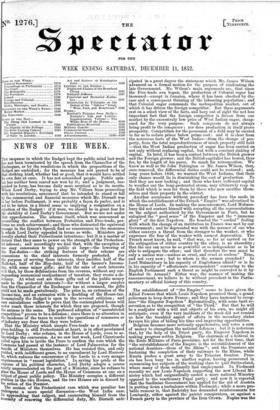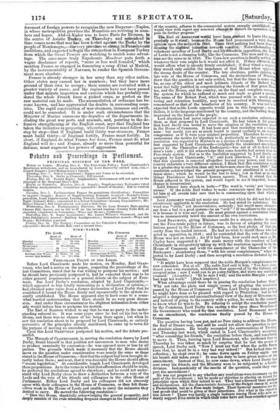The establishment of " the Empire" seems to have given
the Allied Powers that which Louis Napoleon promised them, a grand policeman to keep down France ; and they have hastened to recog- nize "the Emperor Napoleon" diplomatically, with some tacit re- servation as to the recognition of " the Third." But that he will be a coadjutor with a will and objects of his own, we might all anticipate, even if the very incidents of the week did not remind us how the troubled aspect of affairs in the secondary states favours his plan of biding his time and improving opportunities.
Belgium becomes more seriously apprehensive, and votes a sum of money to strengthen the national defences : but it is notorious that, by the help of the Priest party, the Emperor Napoleon is making progress within Belgium. The chairman of a festival in the Ecole Militaire of Paris proclaims, not for the first time, that "the reestablishment of the Empire is the reestablishment of the national frontiers—those of the Rhine " ; and the Prussians are hastening the completion of their railways to the Rhine, while Russia pushes a great army to the Prussian frontier. Prus- sia has been busy too in another region, having persevered in summoning her subjects of the working class to quit Switzerland, where many of them ordinarily find employment. In Piedmont recently we saw Louis Napoleon supporting the new Liberal Mi- nistry which had enigmatically ousted a more national Ministry opposed to the reactionary Papal party ; and now it is reported that the Sardinian Government has applied for the aid of Austria in putting down a turbulence within Piedmont ; while a more pro- bable rumour is, -that Radetzky has demanded reinforcements for Lombardy, either against the patriot conspirators, or against a French party in the province of the Iron- Crown. Naples was the foremost of foreign powers to recognize the new Emperor—Naples, in whose metropolitan province the Muratists are reviving in num- bers and hopes. Abd-el-Kader was to leave Paris for Broussa, in the centre of Asiatic Turkey, on Thursday; and coincident its time comes news that war has been levied against the Turks by the people of Montenegro,—the very province so strong in Panaolavonie ambitions, and expected to begin the commotion in European Turkey from which the Great Powers are watching to snatch some advan- tage. The once-more truly Napoleonic Moniteur puts forth a vague disclaimer of reports, "more or less well founded," which mention France as engaged in fomenting a coup d'etat at Madrid, by the instrumentality of Narvaez, to render the Spanish Govern- ment more absolute.
France is already stronger in her army than any other nation. Other states may exceed her in numbers ; but they have more ground of their own to occupy ; their armies are recruited with a greater variety of races ; and the regiments have not been passed under that minute inspection and exercise which has probably ren- dered the whole French force a picked corps, as perfectas the' raw material can be made. The accumulation of on co has be- come known, and has aggravated the doubts in surrounding coun- tries. The rapid construction of war-steamers, immense and swift, could not be concealed. It is under such circumstances that the Minister of Marine summons the deputies of the departments in- cluding the great war ports and arsenals, and, pointing to the de- • fensive strengthening of the English coast, says that England has taken the initiative in preparing, wherefore France must follow her step by step—that if England build thirty war-steamers, France must build thirty—if England fortify, France must fortify. In short, if England do what France has done, France must do what England will do; and France, already so more than powerful for defence, must augment her powers of aggression.



























 Previous page
Previous page